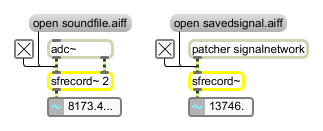Examples

Save an audio file containing 'real world' sound and/or sound created in MSP
Record to audio file on disk
| Name | Type | Opt | Description |
|---|---|---|---|
| number-of-input-channels | int | opt | Sets the number of input channels, which determines the number of inlets that the sfrecord~ object will have. The maximum number of channels is 28, and the default is 1. The audio file created will have the same number of channels as this argument. Whether you can actually record the maximum number of channels is dependent on the speed of your processor and hard disk. |
| int | recording-start/stop-flag (0 or nonzero) [int] |
In left inlet: If a file has been opened with the message, a non-zero value begins recording, and stops recording and closes the file. sfrecord~ requires another message to record again if a has been sent. Recording may also stop spontaneously if there is an error, such as running out of space on your hard disk. |
| format | bit-depth [int] |
A backwards-compatible message for file format. Use the message for full soundfile specification. |
| loop | looping-flag (0 or 1) [float] |
In left inlet: The word , followed by 1, turns on looping. turns off looping. By default, looping is off. |
| open |
file-type [symbol] filename [symbol] |
In left inlet: Opens a file for recording. By default, the file type is AIFF, but sfrecord~ also supports NeXT/Sun, and WAV formats. The word without a filename argument brings up a standard Save As dialog allowing you to choose a filename. The optional symbols , , , or specify the file format (which can also be set in the Save As dialog with a Format pop-up menu). If is followed by another symbol, it creates a file in the current default volume. An existing file with the same name will be overwritten. The format symbol (e.g., ) can follow the optional filename argument. |
| nchans | number-of-channels [int] |
The word , followed by a number in the range 1-28, sets the number of channels for the audio file to be recorded. The default is 1. |
| Outputs cryptic status information about the progress of the recording. | ||
| record | recording-time (milliseconds) [float] |
In left inlet: If a file has been opened with the message, the word , followed by a time in milliseconds, begins recording for the specified amount of time. The recording can be stopped before it reaches the end by sending sfrecord~ a in its left init. |
| samptype |
sample-type [symbol] bit-depth [int] |
In left inlet: The word , followed by a symbol, specifies the sample type to use when recording the audio file (thus overriding the audio file's actual sample type). This is sometimes called "header munging." When reading files in response to the message, the assumed sample type is 16-bit integer. The following types of sample data are supported: : 8-bit integer : 16-bit integer : 24-bit integer : 32-bit integer : 32-bit floating-point : 64-bit floating-point : 8-bit "mu"-law encoding : 8-bit a-law encoding |
| resample | sampling-rate-coefficient [float] |
The word , followed by a float, will upsample or downsample the file. Sample rates are expressed as floating-point values - 1.0 is the current sampling rate, 0.5 is half the current, 2.0 is twice the current sample rate, etc. |
| signal | Each inlet of sfrecord~ accepts a signal which is recorded to a channel of an audio file when recording is turned on. |

| Name | Description |
|---|---|
| sfplay~ | Play audio file from disk |
| MSP Tutorial 16: Record and Play Audio Files | MSP Tutorial 16: Record and Play Audio Files |